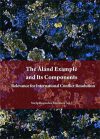Författare/Authors
Redaktörer/Editors

The publication presents the conclusions from a research project that was conducted during 2010 and 2011. The original research project followed two strands; continuity and change as characteristics of the Åland Regime on the one hand, and the Åland Example as a tool in international conflict resolution on the other. Sia Spilopoulou Åkermark, Sarah Stephan and Heidi Öst have outlined features of both continuity and change in what can be classified as the three components of the Åland Example: the autonomy regime and its institutional design, the demilitarisation and neutralization, and the cultural and linguistic safeguards of the minority protection regime. While conflict resolution literature covers a wide area of subjects, there has been limited attention paid to the role of territorial autonomy as a possible conflict resolution tool. Moving beyond the formal aspects of the division of competences between center and periphery, the present book achieves a dual goal. It develops an analytical tool for understanding the durability and robustness of evolving autonomy arrangements. Further it documents and analyses how the Åland Example and its three major components (autonomy, demilitarization and language and culture safeguards) have been used in specific disputes and conflict situations, including in the Caucasus, in Kashmir, in Japan, in East Timor, Tibet and the Israel-Palestine conflict. The book represents a unique combination of theoretical insights with the experiences of well-known diplomats and politicians. The volume further features contributions by Professor Emeritus Yash Ghai, who has provided a comparative perspective, Professor Kjell-Åke Nordquist, who has written on the use of the Åland Example in connection with the negotiations on the international status of East Timor in the end of the 1990s”, Dr. Fuijo Ohnishi, who contributed with an analysis on the Japanese perspectives on the Åland Example and by Member of Parliament Elisabeth Nauclér who has written on her experience in the application of the Åland Example, among others on the Balkans. Spiliopoulou Åkermark, Stephan and Öst had the opportunity to interview prominent diplomats, politicians and scholars, namely Heikki Talvitie, Jan Eliasson, Pär Stenbäck, Terhi Hakala, Thorvald Stoltenberg and Sten Widmalm, on the use of the Åland example in relation to the conflicts in Nagorno-Karabakh, Abkhazia and South Ossetia, Kashmir, South Sudan and Israel-Palestine.
I publikationen samlas resultaten från ett forskningsprojekt om Ålandsexemplets dynamiska natur och om dess betydelse för internationell konfliktlösning som pågått under 2010 och 2011. Forskningsprojektet följde två spår: kontinuitet och förändring som karakteristiska drag i Ålandsregimen å ena sedan, och Ålandsexemplet som ett verktyg i internationell konfliktlösning å den andra. Sia Spilopoulou Åkermark, Sarah Stephan och Heidi Öst har skissat drag av såväl kontinuitet som förändring i vad som kan klassificeras som Ålandsexemplets tre komponenter: självstyrelseregimen och dess institutionella design, demilitariseringen och neutraliseringen samt de kulturella och språkliga garantierna i minoritetsskyddsregimen. Hitintills har territoriell autonomi eller självstyrelse som möjligt konfliktlösningsverktyg fått bara begränsad uppmärksamhet inom konfliktlösningslitteraturen. Genom att föra diskussionen vidare – bortom de formella aspekterna av kompetensfördelning mellan centrum och periferi – når den aktuella boken en dubbel målsättning. För det första skapar den ett analytiskt verktyg för att förstå varaktigheten och hållbarheten hos självstyrelsearrangemang i utveckling. För det andra dokumenterar och analyserar den hur Ålandsexemplet och dess tre huvudsakliga komponenter (självstyrelse, demilitarisering och språk- och kulturskyddsgarantier) har använts i specifika dispyter och konfliktsituationer, inklusive i Kaukasus, i Kashmir, Japan, Öst Timor, Tibet och i Israel-Palestina-konflikten. Boken presenterar en unik kombination av teoretisk insikt med erfarenheterna hos välkända diplomater och politiker. Volymen innehåller bidrag från professor emeritus Yash Ghai, som har tillhandahållit ett jämförande perspektiv, professor Kjell-Åke Nordquist, som har skrivit om användningen av Ålandsexemplet i samband med förhandlingar gällande Öst Timors internationella status i slutet av 1990-talet, dr. Fujio Ohnishi, som har bidragit med en analys av japanska perspektiv på Ålandsexemplet, samt av Ålands representant i riksdagen Elisabeth Nauclér som har skrivit om hennes erfarenheter gällande appliceringen av Ålandsexemplet bland annat i Balkan. Spiliopoulou Åkermark, Stephan och Öst fick möjlighet att intervjua framstående diplomater, politiker och forskare, nämligen Heikki Talvitie, Jan Eliasson, Pär Stenbäck, Terhi Hakala, Thorvald Stoltenberg och Sten Widmalm, gällande användningen av Ålandsexemplet i samband med konflikterna I Nagorno-Karabakh, Abchazien och Syd-Ossetien, Kashmir, Syd-Sudan och Israel-Palestina. Forskningen och publikationen av den ovannämnda volymen möjliggjordes finansiellt genom stöd från Utrikesministeriet, Ålands lagtings jubileumsfond och Ålands landskapsregering och har rönt stor uppmärksamhet, både på Åland och annorstädes.


